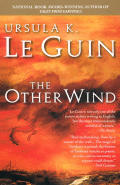
| Series: | Earthsea #6 |
| Publisher: | Ace |
| Copyright: | September 2001 |
| Printing: | October 2003 |
| ISBN: | 0-441-01125-X |
| Format: | Mass market |
| Pages: | 211 |
The Other Wind completes the story that started in Tehanu and makes multiple references to events from The Farthest Shore, so you want to read the earlier Earthsea books before this one. You don't have to read the story "Dragonfly" from Tales from Earthsea, but I'd recommend it; otherwise, you won't really know who all the characters are.
It's hard to say much about this book without spoiling previous books. More than any of the previous Earthsea novels, this is really a sequel, picking up and resolving threads from the previous stories. As well as the revelations at the end of Tehanu, The Other Wind also returns to the question of Earthsea's afterlife, tackling the question of why it seems such a hopeless, Hades-like place.
While it still has the Le Guin feeling of calm, The Other Wind also feels more obviously plotted. The characters are confronted with several serious problems, they set out to solve them, the problems entangle, and at the end of the book they're all resolved. For an Earthsea novel, this is rather direct, although there is still the refreshing depth of characterization, the absence of easy answers, and the sensible response to problems that doesn't involve simply fighting. I still felt a bit dragged into the revelations; while the writing is beautiful, the plot somehow didn't feel quite as natural or comfortable.
Another minor disappointment was that the question of women and magic, at the center of both Tehanu and "Dragonfly," ends up getting sidelined. The challenges to the male-dominated structure of magic came with complications that allow the question of gender roles to be ignored, and in The Other Wind that's largely what happens. While there would clearly be no pat answer to the serious gender role issues in Earthsea, I was hoping to see a bit more on the topic than I did. (And the resolution of the subplot involving the princess seemed a little too easy.)
That being said, this is an excellent book. The ending wasn't at all what I expected, and while sad and a bit disappointing, it's also wonderfully appropriate and symbolic. Ged fits into his ancillary role quite well, and Tehanu continues to be an excellent character, one with enough flaws and biases to feel real and not simply an admirable heroine. I found some of the revelations about Earthsea's background to be a bit pat and too easy, but the way the story is told makes up for it. Recommended.
Reviewed: 2005-01-30